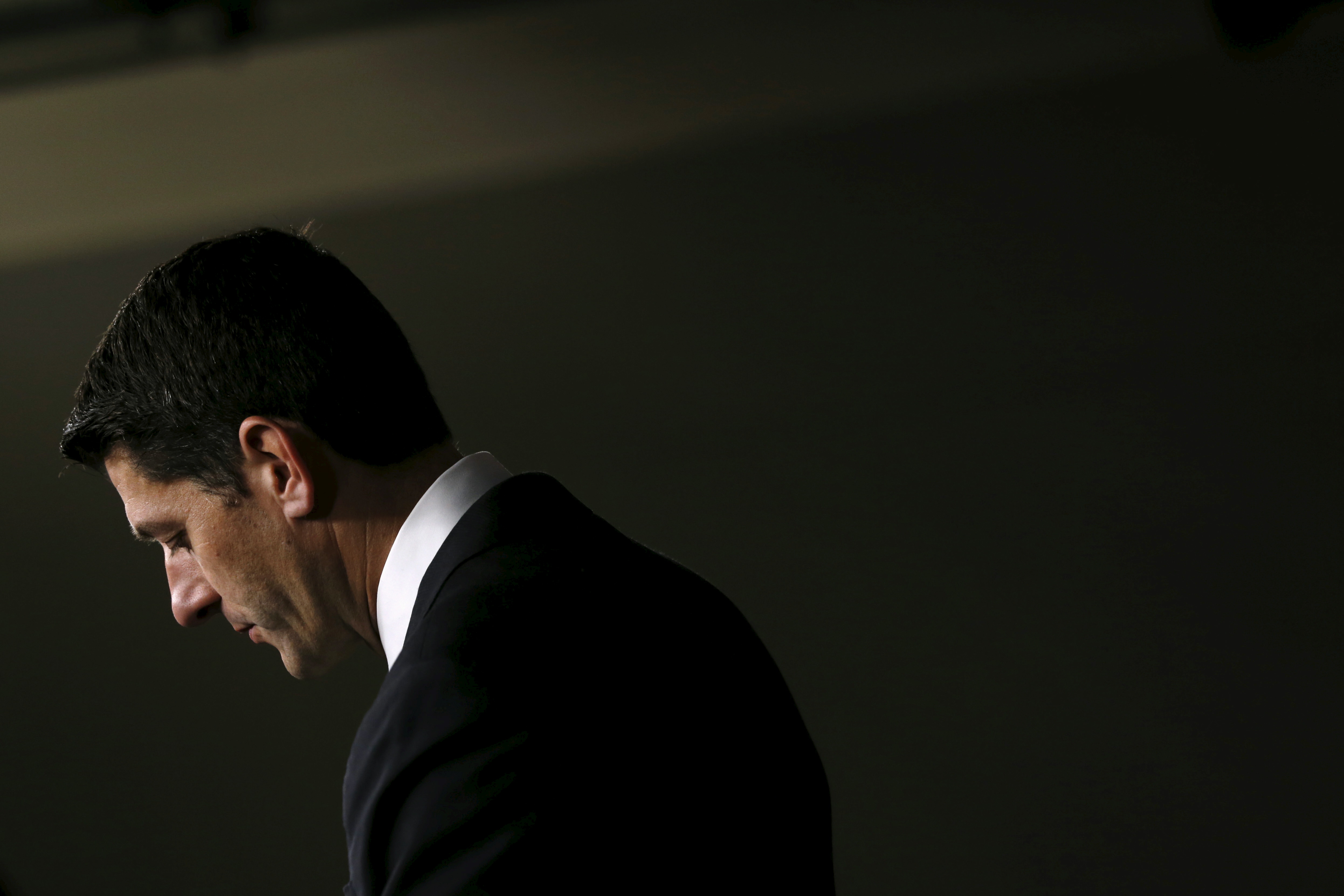Why Paul Ryan is sacrificing his honor to save America's future
Desperate times call for desperate measures


You have to feel for Paul Ryan.
Every year, like aspiring celebrities moving to Hollywood, countless idealistic young women and men move to their nation's capital with the dream of making the country a better place. Paul Ryan was once such a person. And, against all odds, he seemed to come pretty close to being one of the most consequential statesmen in recent American history. Starting out as an intern, he rose through the ranks slowly but surely. As a budget wonk congressman, he earned prominence for his reasoned opposition to ObamaCare and his policy entrepreneurship, which gave him the reputation of a fair and brave man of ideas. As a vice presidential candidate on the Republican ticket in 2012, he became a national figure. Respected by everyone, he walked backwards into the speakership of the House.
Ryan is an intellectual disciple of Jack Kemp. He wants to accomplish the conservative dream of changing the welfare state — not to abolish it, but to reshape it as a more slimmed-down version that encourages work and initiative. Put together, Ryan's plans for reforming entitlements, the budget, and various government programs would amount to the most significant change to America's political economy since the Great Society. This is a goal that, as a conservative, I wholeheartedly support. But even if you don't share those politics, you have to admit that this is, by and large, an honorable and impressive path through politics.
The Week
Escape your echo chamber. Get the facts behind the news, plus analysis from multiple perspectives.

Sign up for The Week's Free Newsletters
From our morning news briefing to a weekly Good News Newsletter, get the best of The Week delivered directly to your inbox.
From our morning news briefing to a weekly Good News Newsletter, get the best of The Week delivered directly to your inbox.
And with the speaker's gavel, he can possibly get it done. The Obama administration has shown the way: The American tradition has changed. The way to pass important legislation is not to build a bipartisan compromise, but to earn one-party control of both houses of Congress and the White House, pass what you want on a party-line vote, give the other party the finger, and then hold on for dear life long enough for your law to become fait accompli.
Through the Obama era, the GOP won control of Congress, and perhaps the House for a generation, with unprecedented GOP control of states, which enabled them to redraw Congressional districts. All that was left was the White House. And with the coronation of one of the most unpopular politicians in America as the Democratic nominee, 2016 looked like the year the GOP could take the White House back. Whoever the Republicans nominated would beat Hillary Clinton, and Ryan would lead conservatives to victory in their decades-long quest to truly limit the size of government.
But we all know what happened to that dream. An orange wrecking ball named Donald J. Trump swooped down on Washington, smashing everything in his path.
Ryan despises Trump and everything he stands for. Ryan despises Trump's protectionist, authoritarian, statist, ethno-nationalist politics. And Ryan surely despises, at a personal level, Trump's stupidity, opportunism, and misogyny.
A free daily email with the biggest news stories of the day – and the best features from TheWeek.com
During the primary, Ryan attacked Trump, albeit mildly. When Trump became the presumptive nominee, Ryan initially declined to endorse him. Many anti-Trump conservatives, myself included, expected Ryan to become their leader.
Instead, something strange happened: After clearly implying that, at the very least, he would not endorse Trump without meaningful concessions, Ryan did an about-face and endorsed Trump with absolutely nothing in return. Ryan has grown increasingly critical of the Republican nominee, but has still declined to rescind his endorsement of him, even as many senior Republican officeholders have.
What is Paul Ryan thinking?
In short, he's doing damage control. He's trying to save the GOP House majority.
In the case of a Clinton presidency — which is looking increasingly likely — it's important to have a GOP House majority to frustrate her agenda. It's also essential for keeping the conservative dream alive. While Trump will almost certainly lose, the goal is to prevent a down-ballot disaster that would erase the gains the GOP has made in past election cycles.
This is why Ryan has told his members to "do what you need to do" with regard to endorsing or not endorsing Trump. Each member can do what's best, given the political dynamics in their own district, hopefully saving as many seats as possible. Try to keep Trump's brand and the GOP's brand as disassociated as possible — criticize Trump whenever he does something truly insane — but don't risk splitting the party by un-endorsing him.
In other words: In a very difficult, destructive time, save what can be saved. And if compromises with honor have to be made, so be it.
Let me be clear: I don't like this situation. It's a stain on Paul Ryan's reputation, and on the GOP's reputation, that he has abandoned his own principles. But I'm not a politician, and it costs me nothing to denounce Trump full-throatedly. Honor without cost is easy. What Paul Ryan is doing is hard.
Pascal-Emmanuel Gobry is a writer and fellow at the Ethics and Public Policy Center. His writing has appeared at Forbes, The Atlantic, First Things, Commentary Magazine, The Daily Beast, The Federalist, Quartz, and other places. He lives in Paris with his beloved wife and daughter.
-
 The elite falcon trade in the Middle East
The elite falcon trade in the Middle EastUnder the Radar Popularity of the birds of prey has been ‘soaring’ despite doubts over the legality of sourcing and concerns for animal welfare
-
 A running list of the international figures Donald Trump has pardoned
A running list of the international figures Donald Trump has pardonedin depth The president has grown bolder in flexing executive clemency powers beyond national borders
-
 Mixed nuts: RFK Jr.’s new nutrition guidelines receive uneven reviews
Mixed nuts: RFK Jr.’s new nutrition guidelines receive uneven reviewsTalking Points The guidelines emphasize red meat and full-fat dairy
-
 The billionaires’ wealth tax: a catastrophe for California?
The billionaires’ wealth tax: a catastrophe for California?Talking Point Peter Thiel and Larry Page preparing to change state residency
-
 Bari Weiss’ ‘60 Minutes’ scandal is about more than one report
Bari Weiss’ ‘60 Minutes’ scandal is about more than one reportIN THE SPOTLIGHT By blocking an approved segment on a controversial prison holding US deportees in El Salvador, the editor-in-chief of CBS News has become the main story
-
 Has Zohran Mamdani shown the Democrats how to win again?
Has Zohran Mamdani shown the Democrats how to win again?Today’s Big Question New York City mayoral election touted as victory for left-wing populists but moderate centrist wins elsewhere present more complex path for Democratic Party
-
 Millions turn out for anti-Trump ‘No Kings’ rallies
Millions turn out for anti-Trump ‘No Kings’ ralliesSpeed Read An estimated 7 million people participated, 2 million more than at the first ‘No Kings’ protest in June
-
 Ghislaine Maxwell: angling for a Trump pardon
Ghislaine Maxwell: angling for a Trump pardonTalking Point Convicted sex trafficker's testimony could shed new light on president's links to Jeffrey Epstein
-
 The last words and final moments of 40 presidents
The last words and final moments of 40 presidentsThe Explainer Some are eloquent quotes worthy of the holders of the highest office in the nation, and others... aren't
-
 The JFK files: the truth at last?
The JFK files: the truth at last?In The Spotlight More than 64,000 previously classified documents relating the 1963 assassination of John F. Kennedy have been released by the Trump administration
-
 'Seriously, not literally': how should the world take Donald Trump?
'Seriously, not literally': how should the world take Donald Trump?Today's big question White House rhetoric and reality look likely to become increasingly blurred
